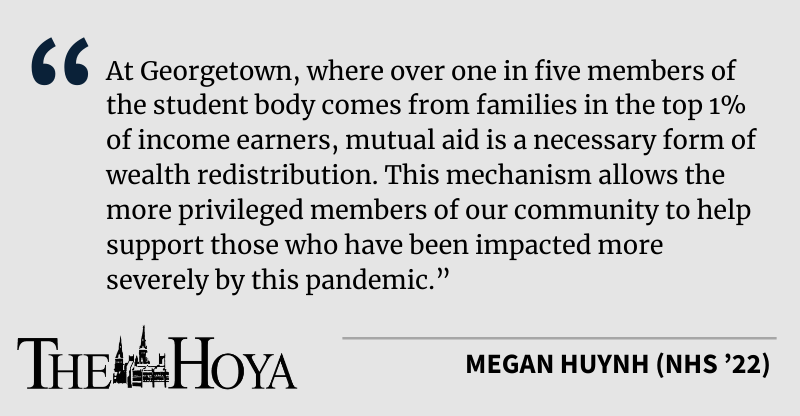At the start of the COVID-19 pandemic, images of frenzied shoppers stocking up on toilet paper or fighting over the last bottle of hand sanitizer flooded the news as people panicked and attempted to take care of themselves during such a chaotic time. Families across the country struggled to provide for themselves as they faced reduced work hours, housing instability, lack of ability to obtain medical care and food insecurity. This pandemic has both highlighted and exacerbated wealth inequality on all levels. While some families are able to jet to their second or third homes to safely quarantine, others are putting their lives on the line as essential workers because they must provide for their families. At Georgetown University, these unseen monetary burdens have placed a heavy strain on students and their families. In light of these particularly difficult times, it is more important than ever for us to come together and support each other, and thus, Georgetown Mutual Aid was born.
Georgetown Mutual Aid was created as a form of community care to meet the needs of our most vulnerable students. Community care is predicated on solidarity, empathy and cooperation within the community as we all work together to take care of one another, which contrasts with our commonly seen individual, self-centered drive for survival. Unlike charity and nonprofits, which require people to meet certain eligibility criteria in order to receive donations and are entrenched in bureaucracy, mutual aid emphasizes the beliefs that everyone has the unequivocal right to have their basic needs met and that everyone has something to offer, while also giving all money raised to students in need. Our community must fill those gaps where people most need support.
Given the major wealth gaps present at Georgetown, where over one in five members of the student body comes from families in the top 1% of income earners, mutual aid is a necessary form of wealth redistribution. This mechanism allows the more privileged members of our community to help support those who have been impacted more severely by this pandemic. We have created a network to better meet the needs of our community. We connect those in need with those who have something to offer, both through an emergency fund and a resource-sharing spreadsheet, encouraging everyone to contribute whatever they can as we strive to take care of each other during this pandemic.
However, the need for mutual aid is not just limited to those facing wealth disparities. Georgetown has one of the best institutionalized support systems for first-generation and low-income students across domestic colleges, and we do not want to downplay or overshadow any of the achievements and efforts of existing programs run by the university. These administrative programs have committed to supporting students identifying as first-generation or low-income before and during this pandemic. Led by their example, Georgetown Mutual Aid emphasizes the need for community care to help support these student populations, while also including our peers who may not identify as FGLI but are still facing serious problems such as strained relationships with their families, recent layoffs or complications with international student visas. Everyone can benefit from this project, whether it is in the form of contributing aid or receiving it.
The outpouring of support from students and graduates demonstrates the love this community has for one another, and they have truly stepped up to provide for those in need. In three weeks, we raised almost $10,000 and have redistributed $6,000 to over 100 students for necessities ranging from textbook fees to weekly groceries. Georgetown Mutual Aid is only one example of how we can practice community care during this critical time; other instances of organizers and student groups practicing community care across the country include the creation of community fridges in an effort to combat food insecurity and food waste and the compilation of resource guides to help students access essentials like short-term housing, food pantries and free WiFi. Moving forward, we hope to grow our fund and expand our aid to graduate, law and medical students and want to serve as a long-term source of support for all students in need. Additionally, we hope to directly support the growth of mutual aid programs at other universities as we continue to build a movement of student activism and solidarity across the country.
Grassroots and volunteer-run activist groups are essential to furthering the growth of our community by creating networks of support that are external to existing systems that historically have not been as inclusive to people of color, LGBTQ+ people, low-income people and other marginalized populations. Community care is necessary because we can only rely on each other to love and take care of one another. Through student activism and organizing, we must continue to foster that support if we all want to survive current and future crises together. If everyone is not thriving, none of us will.
Megan Huynh is a junior in the School of Nursing and Health Studies.














